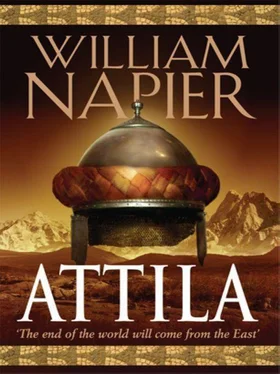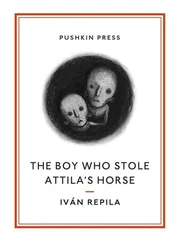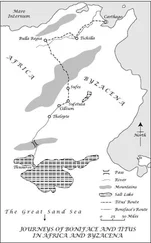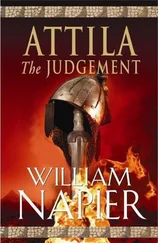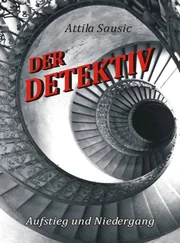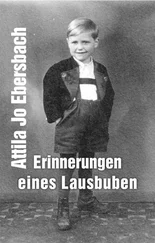William Napier - Attila
Здесь есть возможность читать онлайн «William Napier - Attila» весь текст электронной книги совершенно бесплатно (целиком полную версию без сокращений). В некоторых случаях можно слушать аудио, скачать через торрент в формате fb2 и присутствует краткое содержание. Жанр: Исторические приключения, на английском языке. Описание произведения, (предисловие) а так же отзывы посетителей доступны на портале библиотеки ЛибКат.
- Название:Attila
- Автор:
- Жанр:
- Год:неизвестен
- ISBN:нет данных
- Рейтинг книги:5 / 5. Голосов: 1
-
Избранное:Добавить в избранное
- Отзывы:
-
Ваша оценка:
- 100
- 1
- 2
- 3
- 4
- 5
Attila: краткое содержание, описание и аннотация
Предлагаем к чтению аннотацию, описание, краткое содержание или предисловие (зависит от того, что написал сам автор книги «Attila»). Если вы не нашли необходимую информацию о книге — напишите в комментариях, мы постараемся отыскать её.
Attila — читать онлайн бесплатно полную книгу (весь текст) целиком
Ниже представлен текст книги, разбитый по страницам. Система сохранения места последней прочитанной страницы, позволяет с удобством читать онлайн бесплатно книгу «Attila», без необходимости каждый раз заново искать на чём Вы остановились. Поставьте закладку, и сможете в любой момент перейти на страницу, на которой закончили чтение.
Интервал:
Закладка:
‘No one makes you eat fish.’
He pulled a face. ‘Galla Placidia-’ he began.
‘Now, now,’ she said. She tapped him on the arm, and changed the subject. She touched his bandaged face with a featherlight finger. ‘And what are you going to look like on the steps of the palace, for the emperor’s triumph?’ She pursed her lips. ‘You’ll just have to stand well back. Don’t, for once, attract attention to yourself.’
He nodded, jumped down from the stool, knocking the delicate little table violently as he did so, and sending all Serena’s priceless pots and phials flying. He muttered his apologies, knelt clumsily down to try and help her pick them up again, and then got to his feet and sheepishly slunk from the room at Serena’s exasperated bidding.
She began to pick up the wreckage herself. She shook her head, trying not to smile. That little barbarian. It was true, she had to admit: he did not belong in a palace, that little whirlwind, that fierce force of nature in the making.
The boy paused outside, and touched the bandage over his eye. Sometimes he liked to pretend that she was really his mother: his mother, whom he hardly remembered, who on the night of a full moon had carved those ritual deep blue scars into his cheeks with a curved bronze knife, only a week after he was born, proud of her infant son when he cried so little at the pain. But his mother was dead long since. He could no longer recall what she looked like. When he thought of his mother, he thought of a woman with dark, lustrous eyes and a gentle smile.
Eunuchs went to Galla again and told her Attila had been seen emerging from Serena’s private chambers, wearing a bandage of sorts over his face.
Galla clenched her teeth.
It was the day of the emperor’s triumph.
Outside the cool and formal courtyards of the palace, the teeming city of Rome was in uproar. It was one vast expression of gratitude, one collective sigh of relief. And perhaps, mixed with that relief, there was some perturbation. For the Huns were marching into Rome.
Trumpets blared, banners fluttered and crowds roared all the way from the Porta Triumphalis to the Campus Martius. White oxen were led through the streets, festooned with garlands of late summer flowers, their great heads nodding sleepily as they walked all unawares to their sacrificial doom. Everywhere there were promiscuous swarms of people, drinking and cheering and singing. Among them an experienced eye could pick out the hucksters and fraudsters, the blind beggars huddled against the walls, no more than rag-bound frames of brittle bone, twitching and muttering at passers-by, and the pretend-blind beggars, their hands outstretched, revealing forearms just a little too plump. Here was the veteran soldier with his wooden leg, and there the pretend-soldier hopping along with the aid of a battered crutch, his other (perfectly good) leg strapped up to his buttocks beneath his ragged cloak. And over there the harlots in their high-laced sandals, their soles studded with carefully patterned little hobnails that spelt out ‘ Follow Me ’ in the dust behind them as they sashayed along. They were all doing excellent business on this day of rejoicing and animal spirits. Their large, seductive eyes were lined with black kohl and shadowed with green malachite, and they were startlingly blonde in their elaborate flaxen wigs imported from Germany. Some of them even took off their wigs and twirled them gaily in the air.
For although it was a solemn as well as a festive occasion, celebrating no less than the salvation of Rome itself, the usual cheating and thieving and whoring went on this day as on any other day in the great city. Little had changed in the four hundred years since Juvenal’s time, or in the century since Constantine the Great had declared the empire a Christian empire; since little ever changes in human nature.
Here was the fishmonger selling his ‘spicy fishballs’ – hotly spicy indeed, to disguise the fact that the fish had been netted at Ostia at least two weeks ago. Caveat emptor. Here were the fruit-sellers, with their apricots, figs and pomegranates. Here were the fraudsters and the soothsayers, the ‘Chaldean astrologers’ from the backstreets of Rome, wearing ludicrous cloaks embroidered with moon and stars. Here was the sly-eyed young Syrian with his deft hands and his smile and his loaded dice; and here was another, older man, rheumy-eyed and crooked with age, Greek, so he said, and an unconvincing advert for his own ‘miracle panacea’, an unctuous green liquid sold in grubby glass bottles, which he offered to passers-by – for a fee, of course.
In Rome, anything could be bought for the right amount of money: health, happiness, love, length of days, the favour of God or the gods, according to your taste.
Money could even buy, so it was sometimes scandalously whispered, the imperial purple itself.
On the steps of the Imperial Palace were gathered as many of the royal household as could be accommodated. From every doorway and every upper window, people cheered and shouted and waved banners and cloths, as they did from the meanest houses in the city, leaning precariously from their fifth- or sixth-floor apartments in high-rising insulae.
First in the triumphal procession came the aged senators, as always preceding the emperor on foot as a mark of their subservience. The crowd’s applause was distinctly lacklustre for this superfluous millionaires’ club in old-fashioned togas edged with purple. Then, to thunderous acclaim, the long march-past of Stilicho’s finest troops, his First Legion, the venerable Legio I ‘Italica’, originally raised under Nero and stationed at Bononia. Like other legions, it no longer numbered the full complement of five thousand men, more like two thousand; and they were spending more and more time attached to Stilicho’s mobile field army, fighting to defend the Rhine and Danube frontiers. But at Florentia they had shown they were still the world’s finest troops. Other legionaries had to stand five feet ten inches, but to join the Legio I ‘Italica’, you had to be a six-footer.
They marched proudly by in immaculate order under raised standards fluttering with eagles, or embroidered dragons or writhing serpents, roused to angry life by the wind that ruffled them. They carried only wooden staves rather than swords, as was the custom during a triumph, but they looked hard, fierce men nevertheless. At the back marched their centurions, thick vine-sticks in their fists, grim-faced as ever. Then came Count Heraclian, Stilicho’s second-in-command, his eyes darting and uncertain, always jealous, so it was said, of his brilliant commander. And then, on a dignified white stallion, Stilicho himself. The striking, long, and rather lugubrious face; the intelligent eyes; the manner at once mild and disciplined.
With him was an extraordinary figure. And immediately behind him a further fifty or so extraordinary figures. Indeed, so extraordinary that, as they passed, the crowd that lined the street fell silent and seemed almost to lose its voice.
For beside Stilicho, on a small and skittish bay pony, its fierce eyes rolling to the whites, rode a man such as the Romans had never seen before. He was in his fifties, perhaps, but looked as tough as bullhide. He had curious slanting eyes, and a thin, wispy grey beard which barely covered his chin. His helmet was pointed, and he wore a rough and battered leather jerkin, and over that a broad, dusty cloak of beaten horse-skin. He bristled with weapons: a sword at one side, a dagger at the other; a beautifully crafted bow slung one way across his back, and the other way a quiver packed with arrows. His dark, impenetrable gaze was fixed straight ahead, and although he was of small build he radiated strength.
His name was Uldin, and he called himself King of the Huns.
Читать дальшеИнтервал:
Закладка:
Похожие книги на «Attila»
Представляем Вашему вниманию похожие книги на «Attila» списком для выбора. Мы отобрали схожую по названию и смыслу литературу в надежде предоставить читателям больше вариантов отыскать новые, интересные, ещё непрочитанные произведения.
Обсуждение, отзывы о книге «Attila» и просто собственные мнения читателей. Оставьте ваши комментарии, напишите, что Вы думаете о произведении, его смысле или главных героях. Укажите что конкретно понравилось, а что нет, и почему Вы так считаете.
